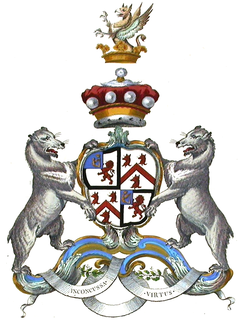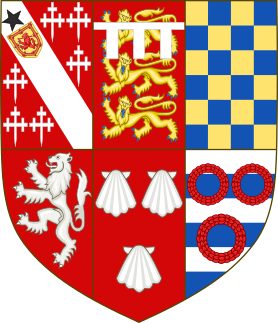Charles Howard, Viscount Morpeth (bap. 22 May 1719 – 9 August 1741) was a British Member of Parliament.

Great Britain is an island in the North Atlantic Ocean off the northwest coast of continental Europe. With an area of 209,331 km2 (80,823 sq mi), it is the largest of the British Isles, the largest European island, and the ninth-largest island in the world. In 2011, Great Britain had a population of about 61 million people, making it the world's third-most populous island after Java in Indonesia and Honshu in Japan. The island of Ireland is situated to the west of Great Britain, and together these islands, along with over 1,000 smaller surrounding islands, form the British Isles archipelago.
Howard was the eldest son of Henry Howard, 4th Earl of Carlisle, [1] and his first wife Lady Frances, daughter of Charles Spencer, 3rd Earl of Sunderland. He gained the courtesy title of Viscount Morpeth in 1738 when his father succeeded to the earldom. He went on a Grand Tour, and after his return, was elected to the House of Commons as one of the two representatives for Yorkshire in May 1741. Like his father, he was an opposition Whig. [1]

Henry Howard, 4th Earl of Carlisle KG, styled Viscount Morpeth until 1738 was a British Whig politician who sat in the House of Commons from 1715 to 1738 when he succeeded to the Peerage as Earl of Carlisle.

Charles Spencer, 3rd Earl of Sunderland, KG, PC, known as Lord Spencer from 1688 to 1702, was an English statesman and nobleman from the Spencer family. He served as Lord Lieutenant of Ireland (1714–1717), Lord Privy Seal (1715–1716), Lord President of the Council (1717–1719) and First Lord of the Treasury (1718–1721). He is the 5th paternal great grandfather of Winston Churchill and the 6th paternal great grandfather of Diana, Princess of Wales.
A courtesy title is a title that does not have legal significance but rather is used through custom or courtesy, particularly, in the context of nobility, the titles used by children of members of the nobility.
By the time of his nomination, Morpeth was already suffering from symptoms of "consumption". His illness gave supporters of the Walpole Ministry and Opposition Whigs time to prepare for the by-election that would occur upon his death. [2] He died at Castle Howard on 9 August. [3] The "consumption" that caused his death appears to have been a "venereal distemper" which he contracted in Italy and which he concealed until it was untreatable. [1]
By-elections, also spelled bye-elections, are used to fill elected offices that have become vacant between general elections.

Castle Howard is a stately home in North Yorkshire, England, 15 miles (24 km) north of York. It is a private residence, and has been the home of the Carlisle branch of the Howard family for more than 300 years.

Italy, officially the Italian Republic, is a country in Southern and Western Europe. Located in the middle of the Mediterranean Sea, Italy shares open land borders with France, Switzerland, Austria, Slovenia and the enclaved microstates San Marino and Vatican City. Italy covers an area of 301,340 km2 (116,350 sq mi) and has a largely temperate seasonal and Mediterranean climate. With around 61 million inhabitants, it is the fourth-most populous EU member state and the most populous country in Southern Europe.
In the subsequent by-election, the ministerial Whig candidate, Cholmley Turner, defeated George Fox, the Tory.

George Fox-Lane, 1st Baron Bingley was a British peer and Tory politician.
| Parliament of Great Britain | ||
|---|---|---|
| Preceded by Cholmley Turner Sir Miles Stapylton, Bt | Member of Parliament for Yorkshire 1741 With: Sir Miles Stapylton, Bt | Succeeded by Sir Miles Stapylton, Bt Cholmley Turner |









